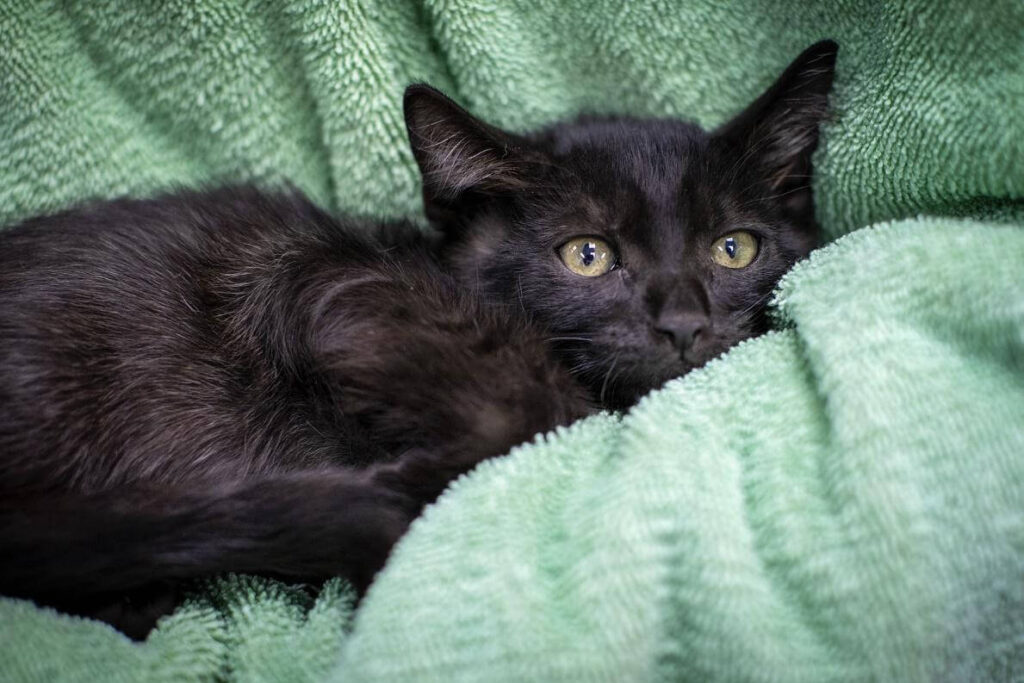Many feral cats have no desire to become housecats. However, sometimes cats become estranged from their original homes and need new ones. These cats usually present as friendly and willing to re-enter life as a housecat.
If you are lucky enough to be approached by such a cat, evaluate if you’re ready to take on the responsibility of a new pet. If the answer is yes, take the cat to a veterinarian before you integrate them into your household. The veterinarian will start with checking for a microchip. From there the vet will want to check for the following issues common to cats who have been living outdoors for an extended time.
Ear Mites
Ear mites are an infectious parasite. They can travel from an infected cat to another feline with close contact, such as when cats play or sleep together. Stray cats commonly contract ear mites, and they can pass them on to other animals.
Cats infected with ear mites will excessively scratch the affected area. They will also shake their heads. You may see a substance that looks like coffee grounds or a thick, red-brown crust on the outer ear.
Your vet will most likely prescribe a commercial ear cleaner to clear out as many of the mites as possible. You’ll probably have to apply an ear mite parasiticide, which is typically a treatment. Most of the time cats do really well with the treatment and do not develop long-term issues.
Internal Parasites
Parasites can also infect the cat’s gastrointestinal system. Common parasites for cats include roundworm, hookworm, and tapeworm. All three mostly come from eating infected food, such as rodents or rotten meat, or ticks. Hookworms can also penetrate the skin and infect the cat that way. Cats who have had to scavenge to eat are especially susceptible.
Typically, GI parasites manifest with expected symptoms such as vomiting and diarrhea. However, other signs of a GI parasite include the following:
- Dull coat
- Coughing
- Bloody or mucous feces
- Loss of appetite
- Potbellied appearance
The treatment for GI parasites depends on the type of worm. However, usually the treatment involves a round of oral medications. With both roundworm and hookworm, cats are in danger of developing life-threatening anemia if the condition is left untreated too long. Bring in a fecal sample to check for internal parasites when bringing your new cat into the vet.
Feline Leukemia, FeLV
Feline leukemia is common with cats who have had to live on the streets for any length of time. The virus comes out in saliva, nasal secretions, and urine. With stray cats, they often contract the disease from bite wounds or mutual grooming.
Symptoms of feline leukemia can take months or even years to manifest, which is why a veterinarian check is so important before introducing a stray cat into a multi-pet household. FeLV is highly contagious and incurable. Unfortunately, some of the time infected cats don’t enjoy long lives. They often succumb to related diseases, blood disorders or cancers. Although, supportive care often keep a cat relatively healthy for years, providing a cancer has not yet devolved.
Feline Immunodeficiency Virus, FIV
Another virus that’s common with stray cats is feline immunodeficiency virus, or FIV. This virus is similar to FeLV in that it’s slow to manifest and can leave the cat susceptible to secondary issues — in this case infections. The most common cause of FIV is deep bite wounds, as when stray cats fight.
FIV presents with a host of symptoms including fever, weight loss, diarrhea, sneezing, and discharge. However, as with FeLV, the disease has already taken a stronghold on the cat’s body once the symptoms manifest.
You can’t cure FIV. However, secondary infections are the greatest risks to these cats. The Veterinarian may want to start your cat on immune-enhancing drugs. You can also feed the cat a diet meant to boost their immune system. Once symptoms start occurring, the cat will need medication for the secondary infections.
In addition to checking for the above common issues, a vet will also look for general maladies such as wounds and ticks. Give a stray cat a new lease on life by offering him a home. If you need any vet services, contact 1st Pet Veterinary Centers.

